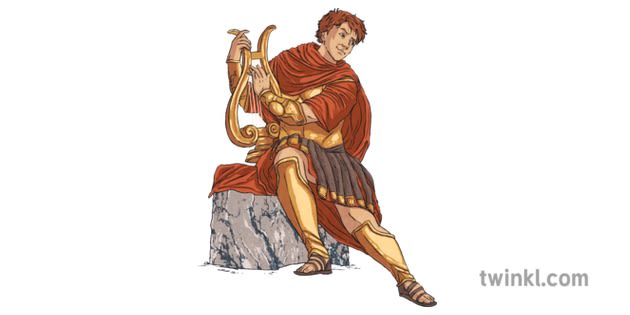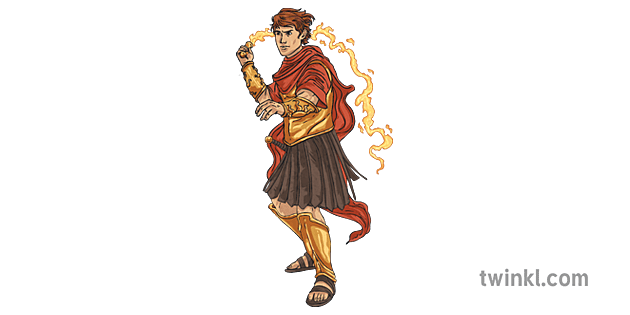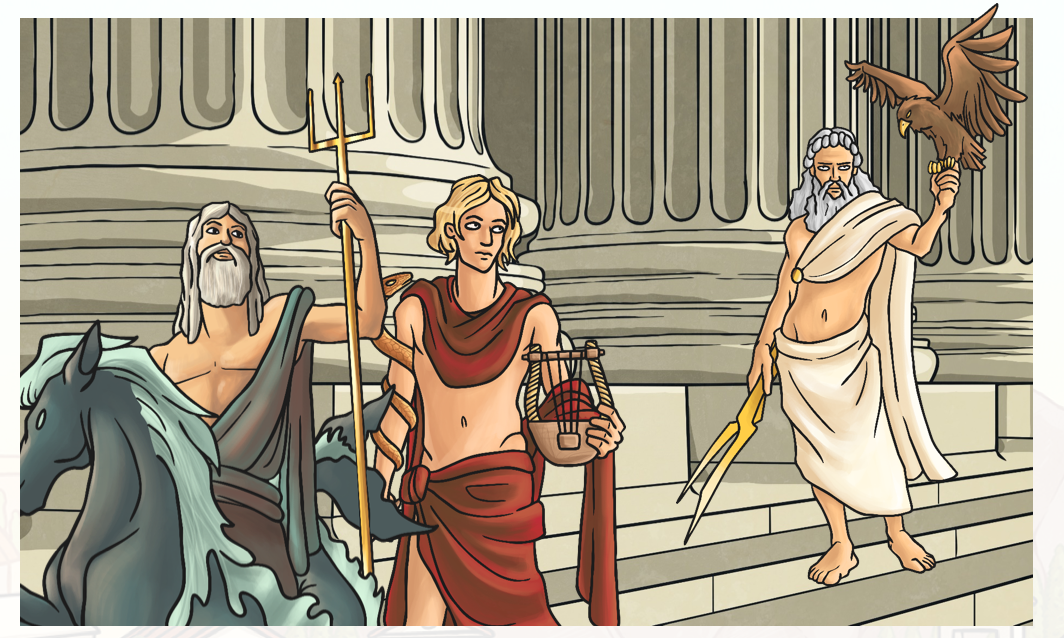

Apollo, The Greek God, was mainly known for being God of The Sun and light, however he was the God of many other things too! He was one of the most important deities that the Ancient Greeks worshipped, and was though to be one of Zeus' favourite sons.

Find out all about Apollo, the Greek God, in this teaching wiki, you will learn all about who Apollo was, his symbolism, how Apollo is featured in Greek mythology, a look at modern-day Apollo and much more!
Are you teaching children about Greek Gods and Goddesses? This teaching wiki all about Apollo, the Greek God, can help you introduce the topic to your class!
The ancient Greeks had a strict set of beliefs that guided them through life and helped them navigate the world around them. They believed in a multitude of Gods and Goddesses and each one stood for a different purpose, and the ancient Greeks would also worship these different Gods and Goddesses for specific reasons.
The ancient Greek religion was based on the belief that there were 12 Gods and Goddesses that ruled the human realm from Mount Olympus in Greece.
Apollo is mostly known for being the God of The Sun and Light, but he is also the God of poetry, healing, music, plagues, knowledge, order, prophecy, beauty, agriculture and archery! Apollo was designed to be the perfect blend of superiority and moral virtue, harmony, moderation and reason personified! Despite this, Apollo is an extremely complex God, and he appears in art and literature almost as often as Zeus himself! Apollo is also one of the only major Gods who has the same name in both Greek and Roman mythology.
The name Apollo is still not properly understood, it’s likely that it means ‘destroyer’ or at least that is what the Greeks take it to mean. But it could also stand for ‘purifier, assembler or redeemer.’ Most scholars disagree with all of that and think the name Apollo originates from the Greek word ‘Apella’ which means ‘A Sheepfold’. This may mean that Apollo was originally a sheep farmer who protected his herd!
If you want a fun resource to help support your teaching on Greek Gods and Goddesses, you can always take a peek at our Greek Gods PowerPoint!

Apollo became one of the most adored Gods in Greek mythology, in works of art he is often pictured nude, posing with a laurel crown on his head and either a bow and arrow, lyre or plectrum in his hands. Apollo has also been linked to several animals such as deer, swans, mice, pythons, wolves and dolphins.
Apollo was one of the twelve Gods that sat atop Mount Olympus, although there are numerous immortals that live in Mount Olympus, these twelve Gods are considered to be the most powerful and important. Apollo, like most Gods, has the power of eternal youth, meaning that he cannot grow old, he also had the power to be completely immune to any earthly disease. Even if Apollo was brutally wounded in battle, he still would not perish, as another of his powers was that he could heal himself with superspeed. Apollo also possessed superhuman strength, so he could overcome any of his enemies!
Apollo is depicted in Greek mythology as one of the most powerful God’s ever to have existed, amongst his other powers he was also known for his supreme skills as an archer. When Apollo was first born he drank something known as Ambrosia, which is an immortality drink, after his first sip, Apollo turned into a beautiful man, and just four days after his birth and transformation he killed The Serpent Python by waiting in its lair and then piercing it through the forehead with one of his arrows! Another memorable kill for Apollo was the slaying of two giants named Otus and Ephialtes, this was also executed by his bow and arrow.
Apollo was the God of many things, including Prophecy this meant that Apollo had the power to divine the future with a high level of accuracy, Apollo would use his ability to see into the future through Oracles, who were thought to be portals where the Gods would speak directly to people.
Apollo also had the power to shape-shift, this is a power all gods have, according to Greek mythology Gods were able to transform themselves into others or objects at will. According to myth, Apollo once transformed himself into a dolphin to hijack a passing merchants ship!
The God of Sun and Light also had the power to heal people and bring disease! Being the God of Music as well, he often chose to heal people through the power of music or through his arrows. On the other hand, he could also use his bow and arrow to rain down plagues and illness down into the mortal realm, causing death and destruction!
He also ability to bless and curse mortals, both of these abilities can be seen in the myth featuring Cassandra, daughter of King Priam and Queen Hecuba. Apollo fell in love with the beautiful Cassandra, and she promised to return his affections if Apollo imbued her with the ability to see into the future. Blinded by love, Apollo bless her so that she would have the gift of prophecy. But Cassandra had lied and broke Apollos heart! Because he had imbued her with a divine power this could not be reversed so in a fit of rage Apollo cursed Cassandra so that she still had the power of prophecy, but no one would ever believe her!

Now we have taken a look at Apollos many strengths and powers, it will surprise you to know that Apollo does have one weakness, and it’s love!
From Nymphs to Humans to Goddesses, poor Apollo seems to fall head over heels with just about any beautiful woman that happens to be walking by, many of his romantic conquests failed because they simply did not return his affections, but the other woman in his romantic life that did love him back left because Apollo was quick to anger and could lose his temper at a moments notice!
The God of Sun and Light, Apollo was one of the only children Zeus trusted amongst the Olympian Gods, Apollo was treated like as an Oracle to the Gods, and Zeus often trusted Apollo to convey his word to the other Gods, so it’s hard to believe that Zeus would ever punish his most trusted son!
Mentioned earlier, Apollo killed the serpentine named Python, who was the child of the Primordial God, Gaia. Python was ordered by Hera to kill Leto, Apollo’s mother, for Zeus’ act of adultery against her. Because of this, Zeus had no choice but to punish Apollo to purify him.
Even though Zeus loved Apollo and all his other children, as the God of Justice he could not show bias to ensure that order is kept under his rule. So even his own children were ordinary when it came to justice.
So Apollo was sent down to Greece to serve as a slave for nine years before he was able to repent for his sins. After The God of The Sun and Light had served his nine year sentence he travelled to the Vale of Tempe, there he bathed in the waters of Peneus and Zeus was able to purify his son through a purification rite.
After Apollo had been purified he was escorted to Delphi by his sister Artemis, he was then handed The Oracular shrine by the Primordial God herself, Gaia. Thereafter, Apollo would be known as the God who purified himself from his sins and made men realize their sins to help purify them too.
All of the above earned Apollo, Zeus’ respect and a seat by his side on Mount Olympus! Zeus also gifted Apollo the city of Delphi, a golden tripod, a golden bow and arrow, and a chariot which would become his signature as a God since then.

The Birth of Apollo - From the very first day of Apollo’s birth, his life was filled with adventure. He was an illegitimate child, with his father being Zeus and his mother Zeus’ mistress Titaness Leto. When Zeus’ wife Hera found out about the pregnancy, she flew into a rage and forbade the mistress Leto to give birth on land and sent the deadly Python to chase her away! Leto managed to escape and found refuge on the floating island of Ortygia. Hera again found out about this and forced the Goddess of childbirth Eileithyia to prolong Leto’s labour for an agonising nine days! Eventually, Leto was allowed to give birth, she had twins, Artemis, and her twin brother Apollo, and it is said that Apollo The Greek God was born into the world fully grown carrying a golden sword. The island around him was said to burst into life around him, filled with beautiful music, fragrant flowers and lush plants.
Apollo and his Son Asclepius - One of Apollo The Greek God’s best-known sons is Asclepius, The God of Medicine and Healing. Asclepius was conceived during an affair between Apollo and Princess Coronis. Apollo sent a white crow to keep watch over Coronis while she was carrying his child. But unfortunately, Apollo found out through the crow that Coronis was having an affair with another man. Apollo was so angry that he told his sister Artemis to kill Coronis and burn the crow on her funeral fire. Just as the flames crept over her dead body, Apollo managed to rescue his unborn son Asclepius from the flames. Meanwhile, the crow’s feathers were permanently blackened by the fire for all eternity.
Apollo and The Trojan War - Apollo, The Greek God, played a very important role in The Trojan War, fighting alongside the Trojans. During the war, Achilles brutally murdered one of Apollo’s sons named Troilus, to add insult to injury Achilles took Troilus’ life on the altar of Apollo’s temple. Apollo was both enraged and deeply grieved, so he set about working on a plan to avenge his son. When Paris fired an arrow at Achilles, Apollo saw his chance. Using his amazing archery skills, he aimed an arrow straight into Achilles’s weak tendon in his heel, this is what famously ended Achilles’s life.
Apollo and Midas - Pan, the Greek God of Shepherds, was a great musician who was known for his invention of the syrinx or more commonly known as the Greek pan flute. Believing himself to be greater than Apollo, Pan challenged the Greek god to a musical duel. Tmolus, the Mountain God, was chosen to be the referee of the musical contest because of his age-old wisdom. The followers of the two Gods came to witness the contest, including a particularly devout mortal follower of Pan named Midas. Pan blew on his reed pipes and produced a rustic melody which made all manner of animals come out of their habitats and the trees swayed along to the music. Apollo then struck the strings of his lyre and produced spell-binding tunes. The creatures of the wood crouched still as stone, the trees kept every leaf from rustling and the gentle air was as silent as a dream. The complete opposite of Pan's tune. When the music stopped, all listeners both animals and humans had a feeling of great grief, as though they had just buried their own mothers and fathers. When the spell of Apollo’s music was broken, the audience fell at Apollo’s feet, and Tmolus immediately proclaimed him the winner. Everyone was satisfied with the judgment, but Midas dissented and questioned the justice of the award. Bemused and angered, Apollo touched the ears of Midas and turned them into the long, furry, dark ears of a donkey!
There are lots of lovely resources that you can use here at Twinkl, here are a few of our personal favourites that are popular amongst teachers and parents alike!
All of these amazing resources are easy to download and yours to use time and time again just with a few clicks!
If you think you have a great idea for a resource, and you want to share it with us, please do! We love to hear from all our lovely members here at Twinkl, and love learning new ways to complete our mission to help those who teach!
We also want you to be able to plan your lessons as easily as possible, we know how busy you are! Our award-winning Twinkl PlanIt has a whole section dedicated to Ancient Greece For UKS2? It will help you teach all about the Ancient Greek civilisation, who they were as a people and how they built their empire!
For more teaching wikis about Greek Gods and Goddesses, you could take a look at these!